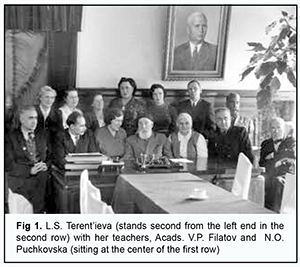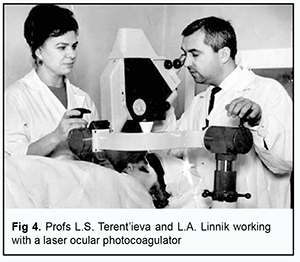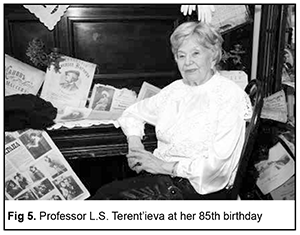J.ophthalmol.(Ukraine).2022;4:82-84.
http://doi.org/10.31288/oftalmolzh202248284
Received: 20.06.2022; Accepted: 18.07.2022; Published on-line: 24.08.2022
A Legend of Ophthalmology
In Memoriam of Professor Liudmila Sergiivna Terent’ieva
TO CITE THIS ARTICLE: In Memoriam of Professor Liudmila Sergiivna Terent’ieva. J.ophthalmol.(Ukraine).2022;4:82-84. http://doi.org/10.31288/oftalmolzh202248284
 On September 17, 2022, we would have been celebrating the 95th birthday of Dr Sc (Med), Professor Liudmila Sergiivna Terent’ieva, but, unfortunately, she passed away after a brief and serious illness on February 7, 2015.
On September 17, 2022, we would have been celebrating the 95th birthday of Dr Sc (Med), Professor Liudmila Sergiivna Terent’ieva, but, unfortunately, she passed away after a brief and serious illness on February 7, 2015.
Liudmila Sergiivna was one of the best pupils of Acad. V.P. Filatov and Acad. N.O. Puchkovska. Throughout her life, she tried to develop further and promote the ideas and knowledge she had gained from her teachers, and to instill the basics of the Filatov’s ophthalmological school in her young colleagues. She used to repeat the Acad. Filatov’s words “the path of science is thorny, but there is nothing better than science and truth”, and even the most hopeless patient should be cared for to have him or her “see the light in all its beauty of various colors and forms”.
L.S. Terent’ieva was born on September 17, 1927, into a military serviceman’s family, at a railway station of Kotelnikovo, not far from Stalingrad. Since Liudmila’s father was a military serviceman, the family had to change their places of residence frequently. She began attending school in first grade in Stalingrad in 1935, than was transferred to a school in the city of Ordzhonikidze (now Vladikavkaz), the capital of the North Ossetian ASSR, and later, to a school in the town of Korosten, Zhytomyr region, where she spent three school years. When the World War II came to their country, the family lived in Korosten, and she had to come back to Stalingrad. When the battle front started coming closer to Stalingrad, Liudmila and her mother went to the town of Andizhan in Uzbekistan, where she completed the 8th grade, and then to the city of Astrakhan, where she completed the 9th grade. As the battle front was moving westwards, the family went to the town of Pomichna, Kirovohrad region, Ukraine, where Liudmila completed her high school education and was awarded a gold medal for her educational excellence. Becoming a doctor was her dream, and her mother did want her daughter to become a doctor, so she went to Odesa to enter the Odesa Medical Institute, and was accepted there without entrance exams as a gold medal winner.
After graduating cum laude from the Odesa Medical Institute in 1950, L.S. Terent’ieva was directed to her first job as a medical resident at the Institute of Eye Disease run by Acad. V.P. Filatov. For 65 years, from that year and until her last days, she could be seen every workday morning walking along the French Boulevard to her place of work at the institute. This path was a gift of fortune to her, and she was really grateful to Fate for this path.

L.S. Terent’ieva was a medical resident until 1953. From 1953 to 1964 she was a junior researcher, from 1964 to 1973, a senior researcher, from 1973 to 2002, Head of the Ocular Oncology and Laser Microsurgery Department, and thereafter, a chief researcher of the department.
In 1958, she defended a Cand Sc (Medicine) thesis “Experimental and clinical studies on sympathetic inflammation” under the supervision of Acad. N.O. Puchkovska. A large portion of that work included chick studies based on the methodology of Eugene Schreck, a German scientist; those studies enabled developing a chick model of plastic sympathetic uveitis. The clinical studies aimed to examine the use of the method of tissue therapy in the combination treatment of sympathetic uveitis, a severe eye condition.
Liudmila Sergiivna defended her Dr Sc (Medicine) dissertation “Method of photocoagulation in the treatment of uveal melanoma” in 1975. That extensive experimental and clinical research was started in 1961 after developing and application of the experimental ruby laser ocular photocoagulator. The strains of the Brown-Pearce carcinoma, Harding-Passey melanoma and Royce sarcoma were obtained from the Republican Oncology Institute in Kyiv to fulfill the major purpose of the experimental study, developing a rough methodology for destroying the intraocular tumor with a laser. Clinical studies were conducted to develop the details of the methodology for destroying the uveal melanoma. Acad. N.O. Puchkovska was a research consultant of the doctoral dissertation.
Professor L.S. Terent’ieva, the first national scientist to use laser irradiation for the treatment of intraocular tumors, developed a methodology for xenon laser photocoagulation of malignant intraocular tumors, e.g., melanoma.
Hundreds of thousands of patients and their families are grateful to her for saving their lives and enabling them to see the light. L.S. Terent’ieva became a serious scientist well known, not only over the country, but also in many countries of the world.

She and Professor A.I. Pakhomova were the first to establish and develop the eye oncology service in Ukraine and the former USSR since 1961. In 1981, she became the head of the newly established Ukrainian Eye Oncology Center at the institute. The patients from not only the former USSR republics, but also from Bulgaria, Yugoslavia, Hungary, Poland, Greece and Lybia have been treated there.
Professor Terent’ieva may be considered to have established a school of ocular oncology surgery; she supervised seven candidate of science theses and was mentor of three scientists who defended their higher doctorates. In addition, she authored and co-authored more than 330 research publications and 3 monographs, including a chapter on the clinical features, diagnostic assessment and treatment of ocular tumors in an Atlas of Diseases of the Eye edited by Acad. N.O. Puchkovska. Moreover, she authored or co-authored ten methodical guidelines and guide sheets and nine suggestions for improvement, and obtained three inventor’s certificates. L.S. Terent’ieva regularly contributed to an advanced qualification of doctors regarding the diagnostic assessment and treatment of tumors of the eye and adjacent structures, and conducted 44 off-site seminars on this subject in 24 regions of Ukraine. This resulted in increased oncological alertness among doctors and improved (earlier and more reliable) tumor diagnosis, contributing to early presentation of patients and improved surgical strategy. This, in turn, contributed to improved opportunities for the preservation of the eye and an improved survival prognosis for patients.

L.S. Terent’ieva taught her younger colleagues the importance of solving current and difficult science problems, developing and implementing novel diagnostic assessment and treatment techniques, being persons of integrity and unbending principles, asserting personal opinions, and reporting personal achievements in science and clinical research domain at conferences and congresses both in the country and abroad. She herself active participated in science meetings both in Ukraine and abroad (Poland, Bulgaria, Italy, France, Hungary, the Netherlands, Turkey, UAE, Germany and Egypt). She often repeated the words of her teacher, Acad. V.P. Filatov, “pessimism at the patient’s bed and in science is unproductive, and the future does not belong to pessimistic people”, “there are no hopeless patients, there are bad doctors”, and “one should do one’s best to maintain the patient’s hope for improvement, especially that of a severely affected patient”. V.P. Filatov wrote:
“Learn serving science in a selfless manner,
To make your hands capable of restoring patient’s vision”.

Acad. V.P. Filatov and Acad. N.O. Puchkovska were great scientists and patriots of national ophthalmology, established a first-class school of science with humanism and optimism, and taught their young colleagues to love their specialty, science and the patient. The L.S. Terent’ieva’s worked under the guidance of the academics, and believed her research and clinical activity, with its victories and failures, to be crucial, it was an inspiration of her life.
She was skillful in combining her research and clinical activity with public activities. At the time of the Soviet Union, for many years she was the leader of the institute’s branch of the Young Communist League and later the leader of the institute’s branch of the Communist Party of the Soviet Union and the chairperson of the local trade union branch. In addition, she was a member of the specialized academic council for the defense of doctoral dissertations, member of the institute’s Academic and expert councils, board member of the Association of Ophthalmologists of Ukraine, editorial board member of the “Journal of Ophthalmology (Ukraine)”, and honorary member of the Bulgarian Ophthalmological Society.
Professor L.S. Terent’ieva was many times awarded National Academy of Science and Ministry of Health diplomas for her achievements in research, clinical and pedagogical activities, contributions to national ophthalmology and ocular oncology, and introducing research into clinical practice. Moreover, she was awarded the Order of Honor, the Medal for Valiant Labor and the Excellence in Public Health Award. In 2010, L.S. Terent’ieva was awarded the Legend of Ophthalmology diploma for her outstanding achievements in and valuable contributions to ophthalmology.

Professor L.S. Terent’ieva will remain in the memory of her pupils and colleagues as a “legend of ophthalmology” (particularly, ocular oncology), a person of high culture and education, and a smart and beautiful woman.
Team of the Ocular Oncology Department,
SI "The Filatov Institute of Eye Disease
and Tissue Therapy of the NAMS of Ukraine"
